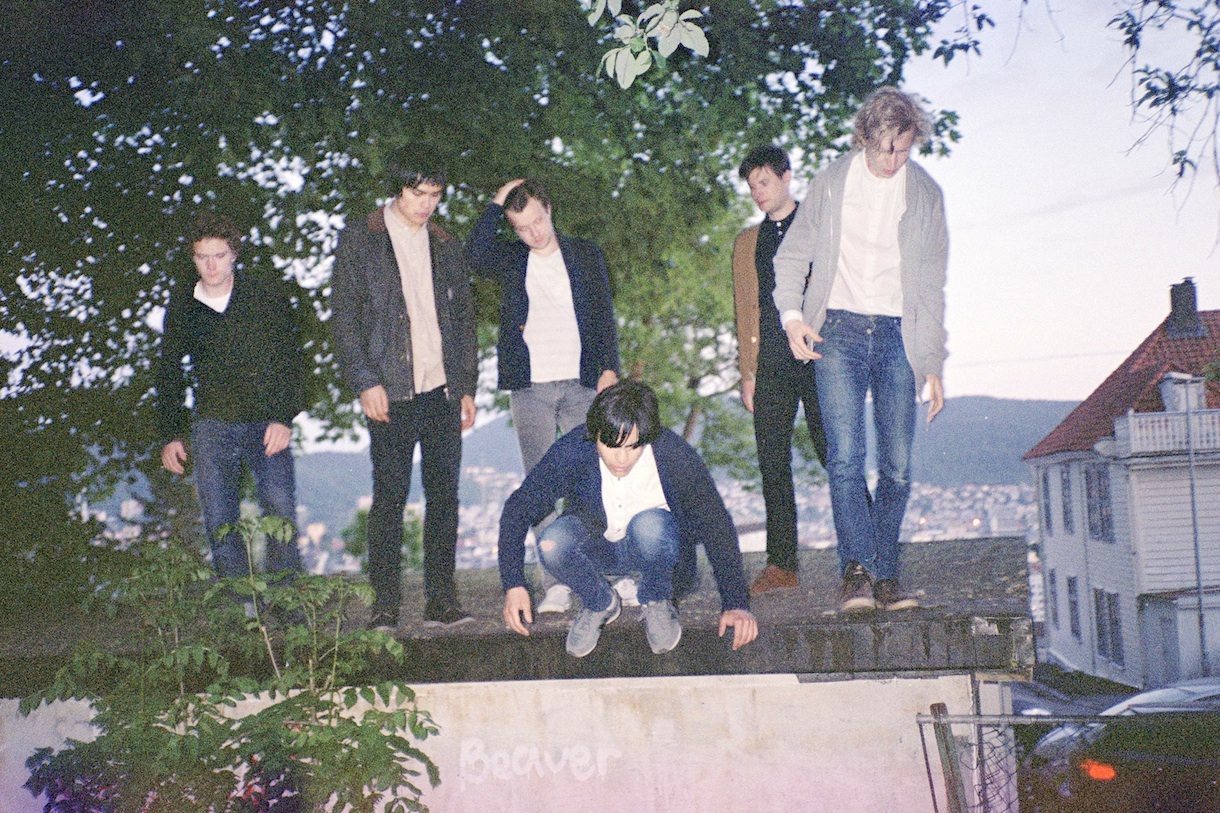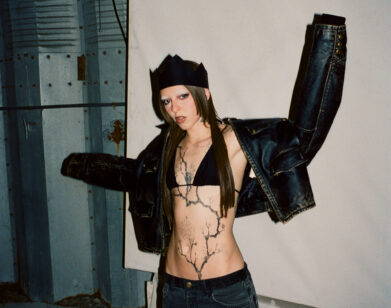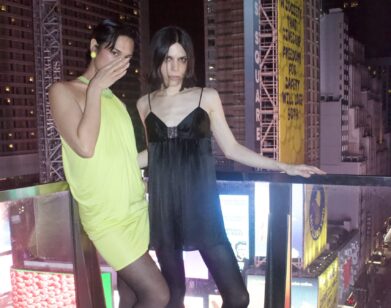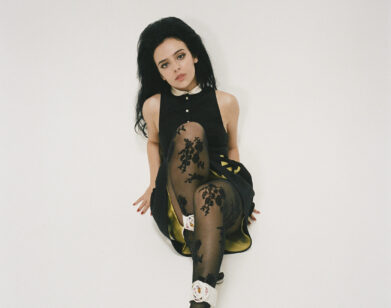Exclusive Video Premiere and Interview: ‘First Days of Something,’ Young Dreams

ABOVE: YOUNG DREAMS. IMAGE COURTESY OF ANDREW AMORIN
“What does it mean to be part of a collective?,” we ask Young Dreams’ Matias Tellez over Skype. He’s sitting on a couch with his brother Pablo—also a member of the Norwegian band—just before they head out to a production of Henrik Ibsen’s play A Doll’s House at a local theater. “I don’t know what a collective is exactly,” he shrugs, “But maybe there’s one guy who makes sure everything is clean. Maybe I’m that guy.”
As the de facto leader of Young Dreams, Tellez acts something like a musical director, positioning the multiple vocalists, lyricists, and players into one perfectly orchestrated mass of life-affirming indie-pop. The group’s debut LP, Between Places, is a testament to youthful uncertainty, right down to its title. As Matias explains, the idea of “young dreams” itself is rooted in teenage thoughts about the future. Listen to their songs, and the music is saturated with the naive notion that we could accomplish anything, if only we knew what we wanted.
We caught up with Matias to talk about the origins of the project (“It was a good time to explore the studio me and my friends had built in a basement in Bergen”) and to learn about his inspirations, the process of making music with a 12-person group, and how Schubert was the first real pop star. Along with the interview, check out an exclusive live video of the band playing their song “First Days of Something.”
NATHAN REESE: So tell me a little bit about how the band started?
MATIAS TELLEZ: I just started recording some songs. Some of it was going to be part of my third solo album, but then I got dumped by my label. I thought, whatever, I can just make something else. And I was fed up with singing, so I asked a friend of mine that used to hang around a bar we used to go to if he wanted to sing on a track. Then I asked some other people, and suddenly we were a band.
REESE: Young Dreams is sometimes referred to as a collective. Matias, what’s your role in directing the members?
TELLEZ: When all my ideas and arrangements are done, I send it around to the other guys. I try to take everyone one-on-one into the studio [individually]. I say, maybe to Pablo, “Okay, I’m ready for the bass,” and we go spend a day in the studio. Then maybe I’m ready for synths, and one by one, everyone comes into the studio.
REESE: Would you say “Young Dreams” is a sort of a theme song for the project?
TELLEZ: At the time, it was just the track that achieved the blend of genres I was trying to get out there. It was the mix of trance-y synths, orchestral strings, and vocal harmonies. It was the song that stated what I wanted to achieve at that time. So I sent it to Chris, and he sent me the lyrics for it. And it was really great, he captured what the band was about—he got that feel from the music. At the time it was called “We Light A Fire” or something. And I said, “Those lyrics that you wrote, that’s what Young Dreams is. Let’s just call it ‘Young Dreams.'” That’s how it came together.
REESE: How has your background with classical music played a role in the project?
TELLEZ: I started playing the violin when I was six. We hadn’t heard a lot of classical music when I was growing up, but we had this series of CDs that told the stories of composer. I remember they had one of Edvard Grieg. I remember I got this electric violin—like a toy from my parents. It wasn’t an actual violin, it was just a yellow thing with buttons. Then after a while I said that I’d like to play the violin. After a while, they put me in a public music school. I wasn’t the best one or anything like that. I didn’t learn how to read the notations well, I just remembered everything by ear. But I didn’t play very well, so I stopped when I was 12 and started to write songs on the guitar. And then I realized that I’m not a really good guitarist either! I can make music, but I can’t play it. I read somewhere that Grieg couldn’t play his A-minor piano concerts very well, but he could write. My role was to compose things, but not really play it.
REESE: Was there any particular music you heard that made you realize you wanted to play pop music, rather than classical?
TELLEZ: Yeah, The Beatles, of course. My father played it on the stereo. They had George Martin, who pushed other instruments into their sound, so that opened music up for me. When I heard Pet Sounds, with all the arrangements and harmonies, it blew my mind. And Phil Spector’s stuff. Earlier than that, [Juan García] Esquivel—a lot of ’50s space-lounge music, where they mix the sound of that era in stereo stuff, and synthesizers when they invented that, with an orchestra. Their way of thinking colored what I was trying to do with Young Dreams.
And also, being from a classical environment, I’ve always been provoked by classical musicians thinking that classical music is so much greater art than pop. I’ve always been annoyed by that. With Young Dreams, I imagined what the music would sound like with lyrics, to add instrumentation to the lyrical pieces by Edvard Grieg. Edvard Grieg would have loved Pet Sounds. And the funny thing is that one of our lyricists, Emilio, sent me an article that was just written in the Guardian. And this link talked about exactly what I was trying to do—it was talking about how pop music is the same as classical music. If you go back to Schubert, he invented the pop song. He wrote pieces that were three or four minutes long. He always used vocalists. And the lyrics were about heartache, and love, and miserable times. Kind of like a pop song these days. But if you show it to someone with classical training they’re like “Oh that’s great, because it’s Schubert! But Young Dreams, that’s shit.” [laughs]
REESE: The whole project has this youthful energy to it, right down to the name. What is it about youth that appeals to you?
TELLEZ: Young Dreams, the name, is like an American thing that was invented in the ’50s. Before the ’50s, you were a kid, and then you were an adult. Now, though, you can stop for a while and think about what you want to be when you grow up. That pause in between. Do I want to be a lawyer? Do I want to be a poet? During that time, you get all these “young dreams” about the world. Your parents tell you that you can do anything that you want, but then you turn 20, and they’re like “I think you should be a doctor, instead of a musician.” The first album is about being a teenager. You don’t necessarily have to be a teenager. We live in a time when you can get an education when you’re 30 or 40. It’s like self-realization. A youthful, naïve kind of thing. And I’m kind of developing it on the next album.
REESE: Tell me a little bit about Bergen. What’s the scene like with other artists in the area?
TELLEZ: People ask a lot about that, but Bergen is a small town. Compared to Oslo, we’re kind of forced to be together. If you’re, say, a punker, there are certain places you can go out and drink and be social. You’re forced to get to know each other. It’s very open. Everyone knows each other and helps each other out.
REESE: How do you think living in Bergen has affected the project?
TELLEZ: It’s easy to stay in and work a lot. It’s shitty weather, you don’t go out and lay in the sun. That’s a great thing to do—I love that, but in the summer I don’t really get much done, because it’s so nice to be outside. With the bad weather, you stay inside and dream. You create your own world, because you’re not [outside] in the weather.
REESE: What are some of the day jobs that your band members have?
TELLEZ: Well, we’ve got Rune [Vanderskog], who is one of the lead singers. He works in a bar. I guess he’s always worked in a bar. And Chris [Holm], our other lead vocalist, he’s a session musician and plays in backing bands for solo artists. And Pablo—this is Pablo, by the way… [motions to Pablo]
PABLO TELLEZ: I work in a bakery. So bread and sweets and stuff. And I work as a bass instructor.
REESE: When you guys decide to go on tour, is it going to be hard to take everyone with you?
MATIAS TELLEZ: Well, it’s kind of an issue. You don’t earn that much money, and we haven’t released an album yet. But if people like it and start paying us for our gigs, maybe we can buy sweets instead of selling them. We’ve toured in Europe twice, the second time was with Tame Impala. But you know, it costs money to travel and we can’t work, so we’ll see how it goes.
REESE: What’s next for the band?
TELLEZ: The next album is already half written, so we’re going to Italy this summer to record some strings. When we were there [on tour], we met this guy who had an amazing studio. He spent 10 years building it in a barn in the middle of nowhere in a forest in southern Italy. So we’re going to write the album and record it [here], and then lay all the strings and horns down there.
REESE: Well, thanks for taking the time to talk, what are you guys doing the rest of the day?
TELLEZ: Right now we’re at our parents’ place. I’ve made some fishcakes—we’re going to make some fish burgers.
BETWEEN PLACES IS OUT MARCH 5 ON MODULAR RECORDINGS. FOR MORE ON THE BAND, VISIT THEIR WEBSITE.






